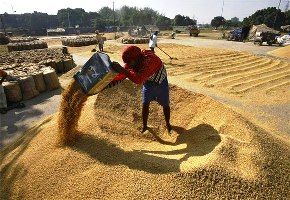 Global food prices fell 1.6 per cent in 2013 as large supplies pushed down international prices of commodities such as oils, sugar and cereals, according to United Nations food agency FAO.
Global food prices fell 1.6 per cent in 2013 as large supplies pushed down international prices of commodities such as oils, sugar and cereals, according to United Nations food agency FAO.
"Over the full 2013 year, the Index averaged 209.9 points, down 1.6 per cent, from 2012, but still the third highest annual value on record." as per the Food and Agriculture Organisation price index.
The FAO price index measures monthly price changes for a basket of cereals, oilseeds, dairy products, meat and sugar.
The agency said higher supplies pushed down international prices of cereals (except rice), oils and sugar.
However, dairy prices peaked in 2013 and meat also hit a record.
Cereal prices declined 7.2 per cent in 2013 over the previous year as there was downward pressure on global prices of wheat and maize in particular, following record harvests.
However, rice prices were up in December 2013, sustained mainly by firming aromatic and japonica rice quotations.
Vegetable oils prices declined to a four-year low in 2013 with the index averaging 193 points in 2013, as compared to 224 points in the previous year.
"The fall
“Soybean oil prices also weakened, reflecting ample soybean supply prospects in South America, while large harvests of rapeseed and sunflowerseed also led to general easing in vegetable oil prices," FAO said.
Sugar prices were also down by 18 per cent in 2013 on the back of greater export availabilities.
"Adding to the downward pressure on international prices were reports of record production in Thailand, the second biggest world exporter of sugar, as well as good harvests in China," the UN body said.
As far as dairy products are concerned, FAO said their prices on the index averaged 243 points, its highest annual value since inception, thereby exceeding the previous maximum of 230 points reached in 2011.
"Demand for milk powder, especially from China, remains strong and processors in the southern-hemisphere are focusing on this product rather than on butter and cheese.
As a result, in context of light trading and most supplies being already committed, prices of the latter have risen more than those for milk powder," the UN body said.
Even meat prices remained at historically high levels in 2013, averaging 184 points, compared to 182 points in 2012 and 183 points in 2011, it added.











 © 2025
© 2025